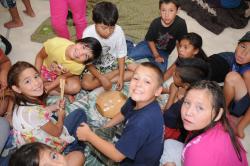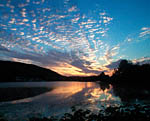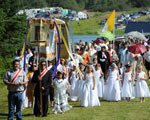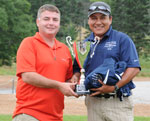Cultural Camp
September 05, 2011

It is a summer camp like no other. The camp has grown and has stood the time of cutbacks and other unforeseen obstacles. The real reason behind the cultural camps longevity is because the people behind it know this camp is something special. The cultural camps gives youth a place for one week to be just kids and in return are given the experience of reclaiming their Mi’kmaq identity.
Eskasoni Mental Health and Social Work Serviceshosted the sixth annual Sa’aqwewijikan Cultural Camp on August 15 – 19, 2011 but the cultural concept of the camp has been in existence for the past 17 years.
Eskasoni Mental Health and Social Work Services (EMHSWS) employees and camp coordinators Arnold Sylliboy and Veronica Bernard took the cultural concept of the camp to another level in July of 2006 and incorporated into a social service youth program.
The cultural camps concept was derived after a community consultative group felt Mi’kmaq youth were losing their culture and it was then they decided to create a camp to restore some of the cultural loss.
Today the Cultural Camp has become more than a tradition for many kids and former alumni; it has become a big part of their summer break lives.
The term “Sa’qewewijikan” is a term which means old place of dwelling; “Sa’qawey” meaning old and “wijikan” meaning place of dwelling. This term was carefully selected by two of Eskasoni’s respected elders; Albert and Murdena Marshall who explained that there is a need for such a camp to help reclaim our Mi’kmaq identities as people.
Elders believe that we must know where we came from by getting in touch with our roots before we can move forward. The objective of this camp is to create a positive atmosphere and a place to learn more about Mi’kmaq history, culture, language, customs and values.
The mission statement for Sa’aqwewijikan Cultural Camp says, “We envision this camp as being a place where we will reaffirm our self worth as Mi’kmaq people. It will also be a place to instill seeds of necessary knowledge to assist in the healthy development of our future leaders.”
This year’s summer camp had 40 youth from different Mi’kmaq communities from Cape Breton and Mainland. For many youth it was an opportunity to rekindle old friendships and for some children, who are under foster care, this was their only time to be with their siblings for a week.
No matter what reason, the camp’s success lies with the volunteers and their genuine passion that this cultural camp works and has a lasting positive effect on the youth.
EMHSWS youth support worker and camp coordinator Arnold Sylliboy has been a part of the camp for many years and has the same passion. Sylliboy says he will be here every year in some capacity or another because the smile on a child’s face is the reward he gets and that’s what brings him back every year.
EMHSWS mental health worker and camp coordinator, Veronica Bernard believes a camp like this should be available to all First Nation communities. Bernard believes the loss of cultural identity plays a big role in the many issues our First Nation communities are dealing with today, “If our youth had a strong sense of culture it would provide them with a lot of healing and bring them back to balance,” she said.
Bernard feels this cultural camp would be a nice model to follow and added, “We would be more than willing to help other Mi’kmaq communities out.”
This year’s camp held many activities from swimming, games, fear factor, and excursions. Cultural component included activities and workshops such as art lessons from Allan Sylliboy, Waltes, Mi’kmaq Medicine and Dance from Wilma Simon, Camp fire and Mi’kmaq story telling, and Micheal R. Denny provide traditional activities for the youth.
Eskasoni Mental Health and Social Work Services would like to thank and acknowledge the funding partners. They include; Youth Resource Centre, Addiction Services, Eskasoni Band Council, Eskasoni Health Centre, Potlotek Board of Education, Eskasoni Mental Health and Social Work Services, Eskasoni Crisis and Referral Centre and Mi’kmaq Family and Children Services. Without their contribution Sa’aqwewijikan Cultural Camp would not be possible.
Also, a big thank you to all the presenters who donated their time, the youth and of course all the volunteers for making the camp such a great success.





